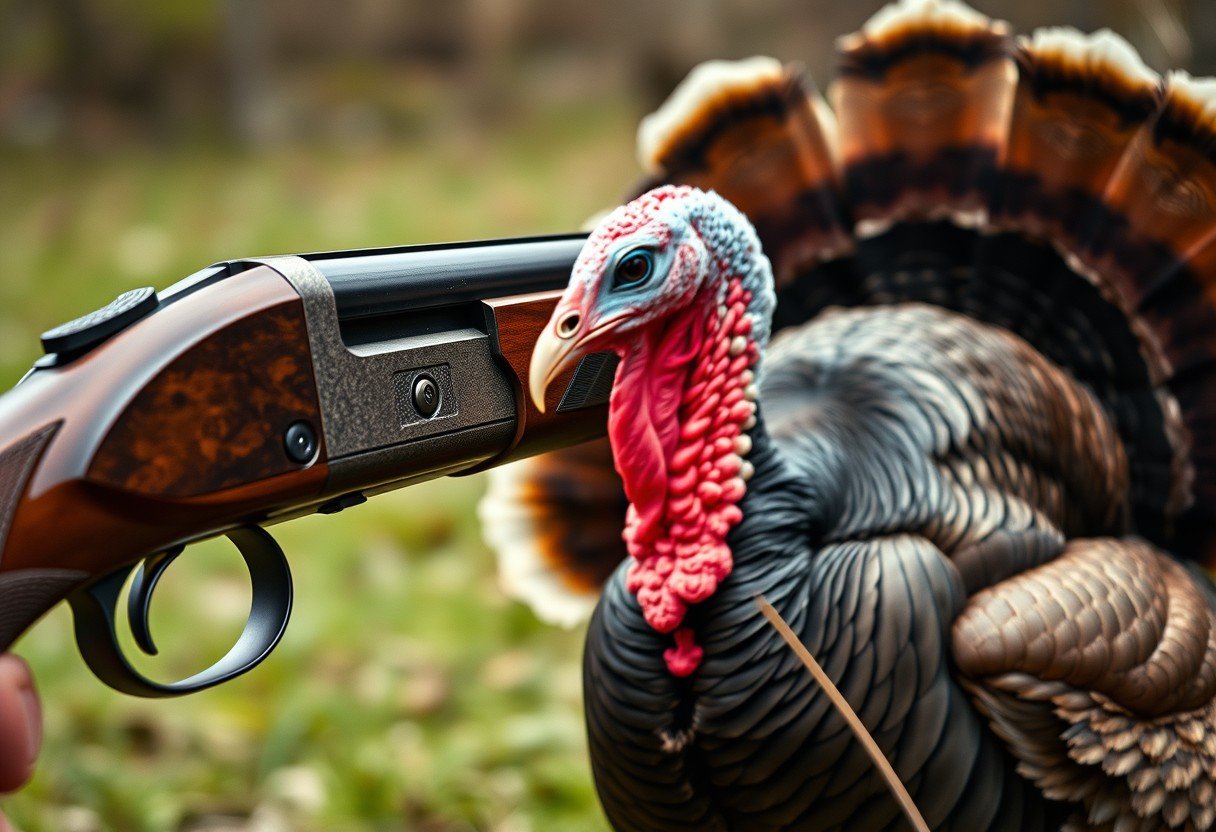Looking for the best shotgun choke for turkey hunting? Here is what to use, where it works, how to set it up, when to take the shot, who benefits from each option and why it matters. This guide explains the best choke choices and simple steps to pattern your gun for clean, ethical turkey kills.
What is a Choke and Why it Matters for Turkeys
A choke is a small constriction at the end of your shotgun barrel that controls how wide or tight the pellets spread. Turkeys are tough birds with small vital zones, so you need a tight pattern.
In the turkey woods, most shots happen between 20 and 40 yards. A tighter choke keeps more pellets on the head and neck at those distances.
The right choke increases pattern density so more pellets land where they count. This means fewer wounded birds and more clean harvests.
Because every shotgun and shell combo is different, your choke choice should be confirmed at the range, not guessed in the field.
Full, Extra Full and Turkey Chokes Compared
Most hunters choose Full, Extra Full or a dedicated Turkey choke. These tighten the shot cloud so it stays dense at typical turkey ranges.
Results vary by gun and load, but the table below shows practical expectations many hunters see at 40 yards when patterning on a 10 inch circle.
| Choke | Pattern Density at 40 yd | Typical Effective Range | Best Use | Caution |
|---|---|---|---|---|
| Full | About 65 to 75 percent | 20 to 40 yd | General turkey hunting with lead | May open up past 40 yd |
| Extra Full | About 75 to 85 percent | 25 to 45 yd | Longer woods shots | Can be too tight at 15 to 20 yd |
| Turkey | 80 percent and higher | 30 to 50 yd | Maximum density with lead or TSS | Requires careful pattern testing |
Dedicated turkey chokes often give the tightest, most even patterns with modern turkey loads. If birds are close, know that very tight chokes can shoot fist sized patterns at 10 to 15 yards, so aim must be exact.
Choosing Shot Size and Loads for Clean Turkey Kills
Pellet size and material change energy and pattern count. Lead shot is common and effective, while tungsten super shot, often called TSS, gives smaller pellets with more energy and very high pellet counts.
Approximate pellet counts per ounce help explain pattern potential. Lead #4 is about 135 pellets, #5 about 170 and #6 about 225. TSS #9 can exceed 360 pellets per ounce, which fills patterns fast.
- #4 and #5 lead carry strong energy for 30 to 40 yards, good for bigger birds and light brush.
- #6 lead boosts pellet count and pattern evenness, great for 20 to 35 yards when you need coverage.
- TSS #7 to #9 keeps dense patterns and strong penetration past 40 yards when paired with a turkey choke.
Choose the load that gives at least 100 to 120 hits in a 10 inch circle at your max range during patterning. Heavier than lead pellets like TSS let smaller shot sizes hit like larger lead while keeping more pellets in the core.
How to Pattern your Turkey Shotgun Step by Step
Patterning shows what your gun, choke and load really do on paper. It also tells you your true maximum range for ethical shots.
Use a large target with a clear turkey head and neck or a 10 inch circle at measured distances like 20, 30, 40 and 45 yards.
- Mount your chosen choke and confirm it is snug and safe.
- Start at 20 yards from a steady rest, aim at the base of the neck and fire one shell.
- Check point of impact and adjust sights or optic so the center of the pattern matches your aim.
- Move to 30 and 40 yards, firing one shell each, marking pellet hits in the 10 inch circle.
- Count hits; aim for 100 to 120 or more in the 10 inch circle at your max range.
- Try different loads and chokes until you see a dense, even pattern with no big gaps.
- Record the best combo and the farthest range you will shoot in the field.
Stop extending range the moment your pattern falls below the ethical threshold. Consistency matters more than one lucky target.
Range, Optics and Aiming Tips in the Field
Most clean turkey kills happen inside 40 yards. Know your exact yardage with landmarks or a small rangefinder so you do not guess wrong.
Red dot sights or rifle style sights help center tight patterns on the head and neck. Keep both eyes open, settle the dot at the base of the neck and press the trigger smoothly.
Avoid shooting through brush. Even small twigs can deflect pellets and open your pattern. Wait for the head to rise and the bird to pause before you shoot.
If wind is strong, shorten your effective range. Crosswinds can shift a tight pattern a few inches at 40 yards.
Common Mistakes to Avoid and Safety Basics
Pressure and excitement can push hunters to take low percentage shots. Slow down and use the plan you proved on paper.
- Do not choose a choke by name only; test it with your actual load and shotgun.
- Do not shoot past the range where your pattern meets the 10 inch circle standard.
- Do not overlook close shots; extra tight chokes can miss high at 10 to 15 yards.
Always identify the target and what is beyond it before pressing the trigger. Treat every firearm as loaded, keep your finger off the trigger until ready and keep the muzzle pointed in a safe direction at all times.
Wear eye and ear protection when patterning and hunting. Quality plugs or muffs and clear lenses make a long season safer.
Quick Gauge and Setup Guide
Both 12 gauge and 20 gauge can be excellent with the right turkey choke and load. Many hunters favor 12 gauge for the widest load options, while a light 20 gauge with TSS patterns very well with less recoil.
Shorter barrels handle well in the woods, but length does not decide pattern quality. The choke and load do. Ported chokes can reduce muzzle jump, though they are not required for tight patterns.
Match the choke to the load first, then confirm the sight system fits your eye and holds zero. A simple red dot, a firm cheek weld and a steady rest will do more for accuracy than any single hardware tweak.
Youth and small frame hunters can use 20 gauge or even 410 with TSS and a turkey choke, as long as patterns meet the ethical pellet count at real distances.
FAQs
What is the best shotgun choke for turkey hunting?
For most setups, a turkey choke or extra full is best because it keeps a tight, even pattern on the head and neck at 30 to 45 yards. Full chokes also work well, especially with lead loads inside 40 yards.
How far can I ethically shoot a turkey with my setup?
Only as far as your pattern puts 100 to 120 or more pellets in a 10 inch circle on paper. For many hunters this is 35 to 40 yards with lead and can be 40 to 50 yards with well tested TSS.
Which shot size is better for turkeys, #4, #5 or #6?
#4 and #5 lead carry more energy, while #6 lead adds pellet count for even patterns. With TSS, smaller sizes like #7 to #9 still hit hard and keep dense patterns at longer ranges.
Do I need a special turkey choke for TSS?
Often yes. Many TSS loads like slightly less constriction than lead to stay even and avoid blown patterns. Pattern several chokes to find the sweet spot.
Is a 12 gauge always better than a 20 gauge for turkeys?
Not always. A 12 gauge has more load choices, but a 20 gauge with a good turkey choke and TSS can pattern as well with less recoil. Choose the one you can shoot accurately.
Where should I aim on a turkey with a tight choke?
Aim at the base of the neck with the head up. This centers the densest part of the pattern on the spine and vital structures for a fast, humane kill.









Leave a Comment